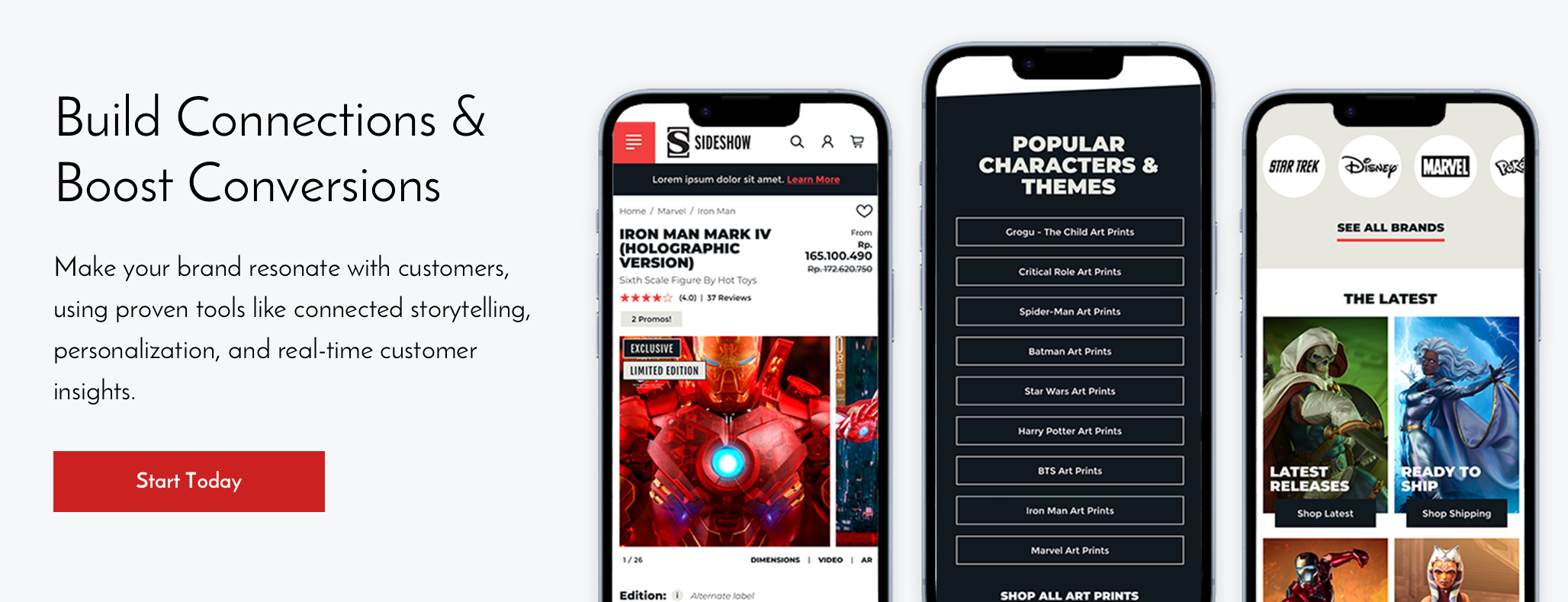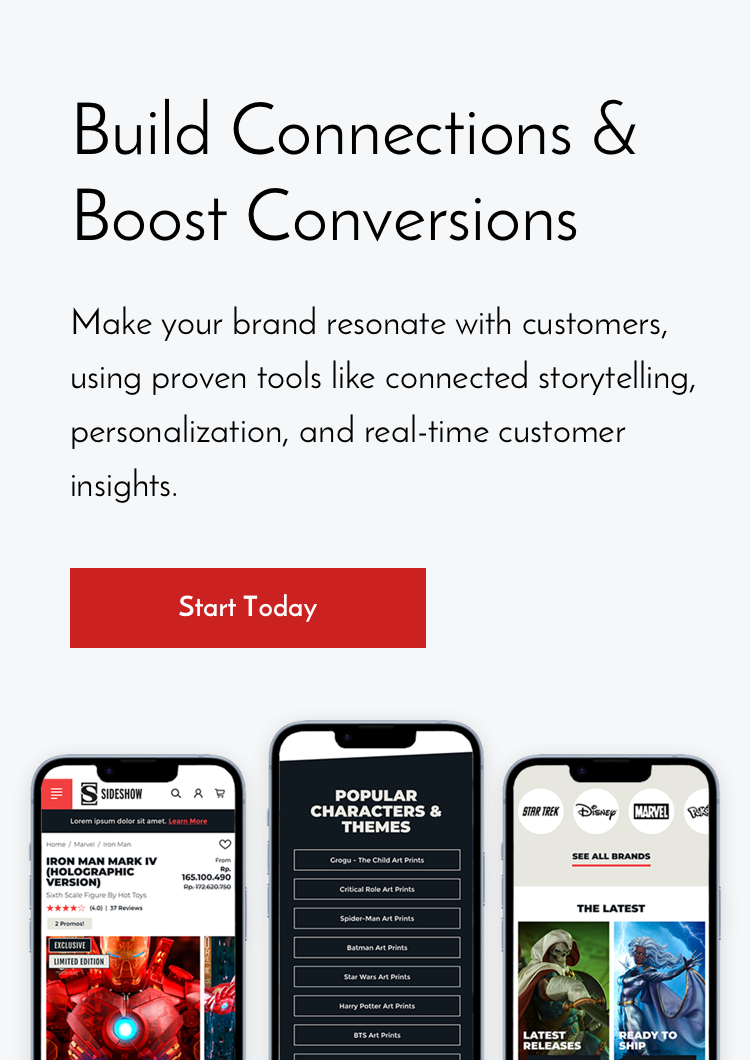B2B ecommerce is rapidly evolving, and the best businesses proactively know how to keep pace. To succeed in the world of B2B ecommerce, it is crucial to seek out the latest trends so you can continue to reach consumers and maintain strong relationships with your current clients.
If you are not mindful of how to keep an innovative approach that rivals your competition, it is easy to fall behind. Fortunately, by keeping an eye on the upcoming B2B ecommerce trends, you can position yourself to meet customer demand and maintain a thriving business.
B2B Ecommerce Trends for 2023
Maintaining a successful business in today’s landscape requires adaptability and innovation. By 2023, US ecommerce sales are expected to reach $1.1 trillion dollars, an expected increase of 14% over 2022. Therefore, it is vital that businesses and suppliers adapt to the continued rise of online shopping by understanding shopper behavior and needs. Last year we saw ecommerce businesses navigate challenges of supply chain disruption, worker shortages, and shipping delays, among many others. This year, you should focus on the following B2B ecommerce trends to stay ahead of the curve.
Faster Order Fulfillment
Businesses are constantly trying to raise the bar for their clients, and clients have high expectations. As a result, faster order fulfillment is a key priority for businesses looking to woo new clients and maintain returning clients.
After all, if one business does not meet a customer’s expectations, then the customer will easily transition to a different option. In fact, 67% of B2B customers say that they will consider switching suppliers if they don’t receive delivery within two days.
In the coming year, businesses will have to adapt to supply chain challenges in order to maintain a high level of satisfaction for their clients. This may even include reducing the complexity of the supply chain to facilitate more direct access and faster fulfillment for consumers.
Optimized Mobile Sites
Our phones are at the center of so many transactions during our day-to-day routine, as we search for things we need and explore the businesses that can help us get them. The business world is no different. Phones are a powerful tool for conducting searches and purchasing the resources needed for an enterprise or small business, and their importance cannot be overstated.
Because phones are a crucial medium for customer engagement, it is vital that your website is optimized for mobile use. B2B mobile ordering has increased by 250% since before 2020, so consumers continue to prefer the mobile route for solidifying purchases, and suppliers need to adjust.
Social Media
Whatever your opinions on social media, there is no denying that it is a powerful tool for businesses looking to build their brand and reach new customers. Although highly effective for B2C ecommerce, the benefits extend to the world of B2B ecommerce as well. The importance and reach of social media are only continuing to grow stronger, as more and more companies recognize its potential for doing business
B2B consumers use social media for a wide range of business purposes. As much as 46% of B2B buyers start their buying journey by using social media, while 40% use social media during the middle stages of their journey, like comparing products, and 35% use it toward the end stages, like verifying information before purchase.
As a result, investment in a social media strategy is crucial for any B2B ecommerce strategy, especially in 2023. Be sure to explore multiple social media platforms and different types of content and posts to see which works best for your business.
Personalized Shopping Experiences
For some customers, a personalized shopping experience is at the top of their wish list. The ability to create a personalized experience serves multiple benefits for a business too. Not only does personalization lead to higher conversion rates, but it also helps provide customers with more convenience in their shopping experience, making them more likely to return to your store to find the things that they need.
Personalization is an important part of the process for many B2B consumers. As a matter of fact, 73% of B2B executives say that customers expect more personalization than in previous years, and 45% of B2B buyers want to see a personalized content portal.
Therefore, by prioritizing personalization during the customer experience, B2B businesses have the potential to see up to 25% higher conversion rates and even a 15% increase in revenue.
Headless Commerce
Headless commerce helps separate the frontend and backend of a website, allowing for easier customization and better connectivity across multiple touchpoints. A headless approach offers multiple benefits, creating an enhanced site that emphasizes the customer experience. With this method, businesses are able to incorporate more integrations, experiment with different user interfaces, and enhance communication between multiple platforms.
This enhanced communication is key, as 80% of B2B customers expect a consistent experience across channels from their supplier—otherwise, they will consider switching to a new one. Headless commerce helps build the bridge across multiple channels so that customers can enjoy a personalized experience no matter how they choose to interact with your business.
Automated Transactions
Saving time is always at the top of the priority list in the world of business. Automated transactions provide the opportunity to save both the consumer and the business time, making them a key trend to look for in 2023. Customers appreciate the ability to check out and buy items without entering all of their information for every purchase and without having to interact with a sales representative, like through a self-service online portal.
In fact, up to 100% of buyers want self-serve options for at least a part of the buying process. By optimizing the pipeline from initial contact to purchase, you increase the number of conversions you receive and save your consumers time along the way, making them more likely to return to your business for the convenience.
Customer Experience
Businesses should not expect to maintain clients based on the quality of their products alone. With the value that B2B buyers place on their time, a positive customer experience (CX) is crucial for any successful B2B business. Buyers seek a good experience so much that 86% of buyers are willing to pay more for a great customer experience, and this trend is unlikely to go away.
If you plan to prove to consumers that your product or services are worth it, it all starts with providing a worthwhile experience. From a fast-loading site to an easy-to-navigate online store, a strong experience is vital. Therefore, there is no better time than now to start investing in a strong customer experience for your ecommerce site. At Guidance, our developers are here to help you prioritize customer experience on your site.
Increased Use of Augmented Reality
Online shopping continues to increase in popularity as customers and clients enjoy direct access to the products they are looking for. Despite the many conveniences of online shopping, traditional shopping still has the upper hand, offering the ability to explore and visualize their potential purchases before committing.
However, the use of augmented reality (AR) has provided a way to bridge that gap, allowing consumers to visualize the size, scale, and detail of a product before purchasing it. As much as 94% of shoppers using AR say that they will continue to use it in the future. However, 52% of retailers say that they are not prepared to integrate the technology. The shift toward AR is here, and it is vital to adapt.
Shopify is a platform that is leading the charge in embracing the potential of incorporating augmented reality into the online shopping experience. At Guidance, we support our clients looking to migrate to Shopify Plus and take advantage of the many solutions to build an engaging online store that drives conversions.
Seamless Omnichannel Interactions
B2B customers appreciate the opportunity to purchase using multiple channels, giving them a variety of options for connecting with the goods they need. Omnichannel commerce means connecting customers to products through multiple platforms and methods along the purchasing journey. An omnichannel, or multichannel, approach means supporting customer interactions through traditional in-store methods, online methods, mobile methods, and beyond.
The convenience of omnichannel commerce requires B2B businesses to provide customers with a seamless omnichannel experience to stay relevant. In fact, B2B customers can use up to ten or more channels to connect with their suppliers. This is double the number from just seven years ago. Experts predict that multichannel sales will increase to 46% of all ecommerce sales in 2023, up 6% from 4 years ago, so there will be no ignoring its popularity.
A Strong Sales Team
The foundation of any good B2B business is a strong sales team. B2B buyers expect expertise from a sales team, which is up to sellers to deliver. A knowledgeable team should be ready to share case studies and examples with a potential consumer and be able to share the value a business can gain from its products. However, 82% of B2B buyers think sales representatives are underprepared for conversations.
Although an optimized site and strong online presence are important, there is no substitute for an easily accessible and knowledgeable sales team that can influence a consumer to take the next step. When focused on building your website, it can be easy to overlook the importance of a strong sales team, but you should never have one without the other.
Seize the Future of B2B Ecommerce
The world of online shopping is rapidly changing, and the future of B2B ecommerce is all about adapting to new technologies and methods to improve the customer experience. In order to stay competitive in the world of B2B ecommerce, it is imperative that you don’t fall behind. Fortunately, with the right help, staying relevant to clients is not far out of reach.
At Guidance, our team of experienced web developers is here to help you adapt your ecommerce approach to changing market trends. We help connect you with the best ecommerce platforms in the industry and provide the support you need to craft a website that is on-brand and optimized for the clients you serve. Learn more about how Guidance can help you bring your ecommerce capabilities to the next level.


